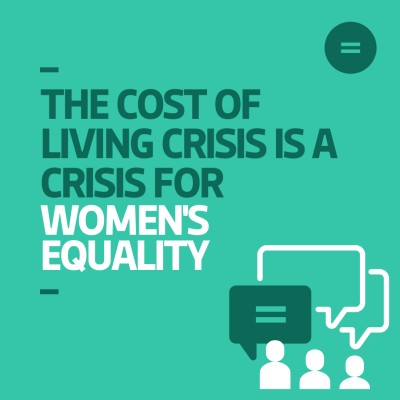Engender blog
Cost of Living Crisis: Another Catastrophe, The Same Shoulders
-400.png)
As part of our blog series on the cost of living, unpaid carer Lynn Williams reflects on the crisis and why government responses bake in further inequality and marginalization. The same shoulders bear the burdens of economic and public policy failures and we cannot allow this to continue, she writes.
It’s hard to know where to start when everything seems so devastatingly awful and overwhelming.
Covid is not over – despite what you might be hearing. And running alongside that ongoing, hellish crisis, there’s another public health and societal disaster in the making.
The “cost of living crisis” is such a misnomer – it’s not a crisis, it’s catastrophic. It’s not a future event – it’s ripping lives apart now.
As I write this, I’m trying not to hyperventilate at the prospect of five figure energy bills; as you read this, you’re probably working out what the heck you cut or stop doing as price rises continue to annihilate your monthly budget. You’re wondering how to keep your disabled child safe and warm; you’re wondering what you can cut back on to ensure that the person you care for has food and the care they need to stay at home.
The cost of living crisis is a crisis for women's equality

The cost of living crisis is an issue which is profoundedly gendered. This blog, containing extracts taken from our submissions to the Scottish Government sets out some of the ways that the cost of living crisis is also a crisis for women's equality.
Women in Scotland are and will be disproportionately impacted by the cost of living crisis, with acute ramifications in terms of economic and physical security, health and wellbeing. This is the result of existing economic inequality that repeatedly sees women, and especially minoritised groups of women, at the sharp end of economic and other crises.
The disastrous forecast for the rate of inflation cannot be divorced from the egregious impact of the Covid-19 pandemic on equality, which has already placed women at greater risk of economic insecurity. A rollback on women’s rights and equality is widely recognised, with specific issues and their ongoing implications manifesting for Black and minority ethnic women, young women, disabled women, unpaid carers, mothers, pregnant women, LGBT women, and women with insecure immigration status, amongst other groups. Against this baseline, the current cost of living crisis will further exacerbate women’s economic inequality, pushing many into poverty. The harm this will cause will resound throughout the course of women’s lives and those of their children.
Downloads
 Engender Briefing: Pension Credit Entitlement Changes
From 15 May 2019, new changes will be introduced which will require couples where one partner has reached state pension age and one has not (‘mixed age couples’) to claim universal credit (UC) instead of Pension Credit.
Engender Briefing: Pension Credit Entitlement Changes
From 15 May 2019, new changes will be introduced which will require couples where one partner has reached state pension age and one has not (‘mixed age couples’) to claim universal credit (UC) instead of Pension Credit.
 Engender Parliamentary Briefing: Condemnation of Misogyny, Racism, Harassment and Sexism
Engender welcomes this Scottish Parliament Debate on Condemnation of Misogyny, Racism, Harassment and Sexism and the opportunity to raise awareness of the ways in which women in Scotland’s inequality contributes to gender-based violence.
Engender Parliamentary Briefing: Condemnation of Misogyny, Racism, Harassment and Sexism
Engender welcomes this Scottish Parliament Debate on Condemnation of Misogyny, Racism, Harassment and Sexism and the opportunity to raise awareness of the ways in which women in Scotland’s inequality contributes to gender-based violence.
 Gender Matters in Social Security: Individual Payments of Universal Credit
A paper calling on the Scottish Government to automatically split payments of Universal Credit between couples, once this power is devolved to the Scottish Parliament.
Gender Matters in Social Security: Individual Payments of Universal Credit
A paper calling on the Scottish Government to automatically split payments of Universal Credit between couples, once this power is devolved to the Scottish Parliament.
 Gender Matters Manifesto: Twenty for 2016
This manifesto sets out measures that, with political will, can be taken over the next parliamentary term in pursuit of these goals.
Gender Matters Manifesto: Twenty for 2016
This manifesto sets out measures that, with political will, can be taken over the next parliamentary term in pursuit of these goals.
 Scottish NGO Briefing for UN Special Rapporteur on Violence Against Women
Joint briefing paper for the UN Rapporteur on Violence Against Women.
Scottish NGO Briefing for UN Special Rapporteur on Violence Against Women
Joint briefing paper for the UN Rapporteur on Violence Against Women.

Newsletter
Sign up to receive our newsletter here:
Sign up to our mailing list
Receive key feminist updates direct to your inbox: